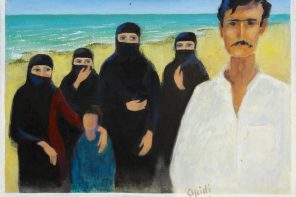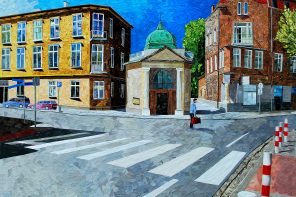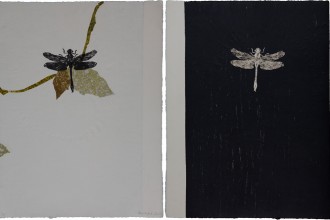A collection of ghost stories told in the back of a bus to Zlatibor on a dark and stormy night
by Constance A. Dunn
It’s that time of year again when the mist starts to descend, when we start re-reading Poe and Lovecraft, streaming episodes of American Horror Story (scary mainly because of Jessica Lange), and renting those Japanese horror flicks that we’ve been too chicken to watch. A very clever friend of mine once told me that classic horror leitmotifs, i.e. zombies, vampires and the like, come from a need to express the emotional horrors of war that are too difficult to describe with words. With this in mind, the Japanese penchant for disturbing stories about the modern world must be an expression of the fallout from Hiroshima and Nagasaki, or maybe a commentary on the social isolation experienced by so many technology-addicted young people. So, that chick who walks backwards down the stairs on her hands and feet in The Grudge is just suffering from radiation poisoning, and The Audition is a feminist vigilante film against Japanese patriarchy. Whatever, I still messed my pants watching them. Leave it to the Japanese to turn the construction of nightmares into a subtle art form. But Japanese horror is another essay all together. I have no wish to bore the reader with a erudite deconstruction on the roots of horror on this day of all days. After all, All Hallows’ Eve and the Day of the Dead are celebratory holidays when adults can get away with acting like children, and children get candy. Somewhere the harvest is in, somewhere the seasonal colours are beautiful, somewhere hot apple cider and mulled wine are being served, somewhere graves are being decorated with sugar skulls, and somewhere people you thought were dull are letting their freak flags fly, so let’s raise a glass. Take this guy I once knew who dressed as Tippi Hedren, complete with head wound, who built a portable phone booth and attached taxodermied birds to it, then spent a day on the streets of Los Angeles posing for an invisible Hitchcock. This is a guy who wore beige pants on a regular basis: god bless the holiday that allows him to be Tippi Hedren. So, instead of an essay, how about a collection of true ghost stories told in a mini-bus on its way up a mountain on a misty October night?
But shortly after the engine started, the mood began to change. The driver informed us that the trip would take an hour longer than expected, not including the drive out of the city. It had been raining for two days straight and traffic, which is typically a bitch anyway, would be bad on the narrow roads. Two hours into a rainy night that was black as pitch and we started to feel road-weary and anxious. An unsettling silence had fallen over the group when traffic came to a sudden halt. A cop in a bright yellow vest approached the driver side window and waved us into the opposite lane. We drove pass a long line of trucks to a road block set up by police. We couldn’t make out why the main road was blocked, but it was clear from the wildly dark speculation coming from the group that the cold, dark and wet driving had had an effect on their imaginations. Our detour led us up a mountain road full of potholes, hugged by trees and distinctive for its hairpin turns. The mini-bus bounced off the potholes like a toddler in an inflatable castle. We hit a thick fog about halfway up and the bus went quiet again. One of my students suggested we play a game together to distract ourselves from the drive. I suggested a ghost story competition. Now, ghost stories may or may not reveal a dark truth about the human condition (this goes in the essay I’m not gonna write), but there is one thing they’re really good at — bringing people together. There we were, a group of strangers and acquaintances, cuddling close like children under a blanket with a torch. Here are the stories we told as they were told that night by members of the group:
“Jessie James at the Talbot Tavern” – Constance’s story
Bardstown, Kentucky — A small town just east of the state’s biggest city. It is known as much for its quiant family homes converted into art galleries and shops, as for its colourful local history. One of the hubs of these colourful local tales is the Talbot Tavern. Now a small bed and breakfast with a tiny restaurant, the tavern had supposedly once been a watering hole for legendary outlaw Jessie James. One of the rooms bears his mark with bullet holes in the walls where James shot at the painted images of birds in a drunken mania. The tavern has never bothered to cover the holes or the mural that inspired them. I discovered the place in high school not long after I had purchased my first car. A car I had worked two part time jobs to save up for, and, at the time, would use any excuse to drive around. Driving the short distances around the city wasn’t enough for me, so I offered to take an exchange student friend to some popular Kentucky sites. We drove to Bardstown to visit the galleries and shops. We toured Talbot Tavern and were shown the vacant rooms, one of which had sheltered the young Abraham Lincoln and his parents for a night. Upon returning home, I told my sisters about the tavern and we decided that we would pool our money to book the “Lincoln†room for our parents as a surprise wedding anniversary gift. Upon their return my sisters and I were anxious to hear about their stay. They told us they had loved the old tavern, and they were charmed by the room full of antique furniture that the owner insisted was “originalâ€, but something strange had happened. They had been awakened in the middle of the night by what sounded like a raucous party just below their room. They said that they had heard banging on the walls, glasses clinking together, possible music and voices. They had been annoyed that reception hadn’t warned them about a party being held in the downstairs restaurant that night and decided that they would mention it to receptionist in the morning. The next day my parents came down the stairs to be greeted by the very same receptionist they had planned to complain to, but before they got a chance open their mouths the woman asked how their night went. They responded that it was great with the exception of the party right below their room. The receptionist looked at them in surprise — “I’m sorry, but there was no party here last nightâ€. My parents didn’t believe her, insisting that there was most definitely was some kind of party. To convince my parents that she was in earnest, she led them to a wooden plank door blocked by a pad-locked bar; a padlock adorned with a few cobwebs no less. She explained that this was the only door to the old saloon and how they hadn’t used it in years because the staff refused to work there. Things happened there, strange things that many attributed to the ghosts of the outlaws who used to frequent the saloon between bank heists and shootouts. The receptionist said, “this is the room below yours.â€
“Give Me a Hand” – Maja’s story told from her point of view
I travel to conferences a lot. They are usually training sessions funded by international entities, like UNESCO, that take me and my colleagues to Moldova, Uzbekistan, Canada, all over. One of these conferences, that had to do with educational initiatives in the EU, was held in a castle that used to be a training ground for the Nazi Youth (perhaps Marienburg Castle in Poland). The castle was very large and well-preserved, but creepy, as castles can sometimes be. But my colleagues and I were still thrilled to be sleeping in a one. At least, I was thrilled until after my first night. After I had gone to bed in the tower room that we were assigned to, I had the one of the worst dreams of my life. It was one of those dreams when you’re not sure if you were sleeping. You’re in something, some stage, between sleeping and waking that you’re sure must be real. Anyway, I dreamt that someone was eating my hand. I awoke in the middle of the night with a sick feeling in the my stomach, and even though every part of me told me not to move, I touched my hand to make sure it was still there. At first I thought that this must be stress, or my imagination was just being overactive because I was in a castle and sleeping away from home. I explained the experience away, until one of the organizers at the event started to tell us stories about the history and legends associated with the castle. One story caught my attention. It was about an aristocratic resident that supposedly kidnapped virgin girls and ate them.
“Baboon” – Aleksandar’s story from his point of view
I once heard a story from Wales about a castle on the west coast of the island (Carew Castle). There was a time when pirates in England who seized goods from Spain and other English enemies were given land and titles. One of these castles was given to a particularly wicked pirate on his return from adventures in South America and Africa. On one of these journeys the pirate had picked up an odd pet — a baboon he named Satan. Of all the primates in the world, the baboon is one of the more terrifying to look at with their large canines and multicolored faces, this may be especially true of a baboon with the name Satan. Unfortunately for this baboon, he became a tool in the wicked pirate’s reign of terror at the castle that began after a family tragedy. Apparently, upon his return the sea captain had become unpredictable, adopted outrageous religious views and developed a puffed up sense of self. His hot-headedness led to an estrangement between him and his only son. The son had fallen in love with the daughter of a lowly trader who was a tenant of the sea captain, far beneath the son’s own social position in his father’s opinion. The father banished the son from the castle and never saw him again. According to legend, this is when the captain’s personality took a turn for the worst. The break with his son had disturbed the captain so deeply that it hardened him to the point of cruelty. Perhaps as a strange form of self therapy, he trained the monkey to attack with the sound of a special whistle that he kept on a chain around his neck. The baboon became the captain’s closest companion, and was often present at dinners the captain held for his crewmen. The captain would drink to excess at these dinners and often insult and mock his guests, while the monkey would mimic him and laugh demonically. It is no wonder that people stopped coming to the castle and the captain was left to dine alone. One night as the captain was sitting in his study with Satan, the trader whose daughter was the cause of the split between father and son came to the door to pay his rent. But business was bad that year, and the trader could only pay half. The captain was furious and blew his whistle for the baboon to attack. The trader was able to fight off the monkey, run from the room and block the door behind him. He was on his way out of the castle when a friendly servant interceded and insisted the trader stay for a drink in the kitchen to wait out the rain and collect himself. As they were enjoying their ale, both the servant and the trader heard an inhuman shriek, then a blood-curdling scream that ended with the maniacal laugh of the baboon followed by silence. They mustered the courage to check the study where the captain had ordered his baboon to attack the trader to see what had happened. What they found was a bloody scene: the captain’s throat ripped out and his head in a pool of blood, and the charred body of the baboon resting on the floor near the fire with his canine teeth bared. People say that the captain got his just reward. But even though the piper had been paid, it is not uncommon for the maniacal laughter that signaled the end of the baboon’s life to be heard coming from the castle ruins. Once a visiting family of tourists who were wandering around the castle rooms had a traumatizing experience. As the parents admired a view from a window, their daughter was drawn to the remains of the fireplace. They heard her scream swearing that she saw a monkey in the fireplace snarling and showing here its huge canine teeth. This family had no knowledge of the castle’s history at the time of this incident.
Another member of the group had just begun a story about a nearby monastery when our mini-bus reached the town limits. So, perhaps on yet another foggy night, on yet another conference trip we’ll learn about the goings on at that ancient, holy place. But on that misty October night in Zlatibor we all went to bed in our cozy hotel rooms, safe in the knowledge that we are reasonable adults who know that these stories couldn’t possibly be true. Or could they? Perhaps next year you’ll get that exemplary essay on the origins of horror and the Day of the Dead.
Constance A. Dunn is Senior Articles Editor for the magazine.





